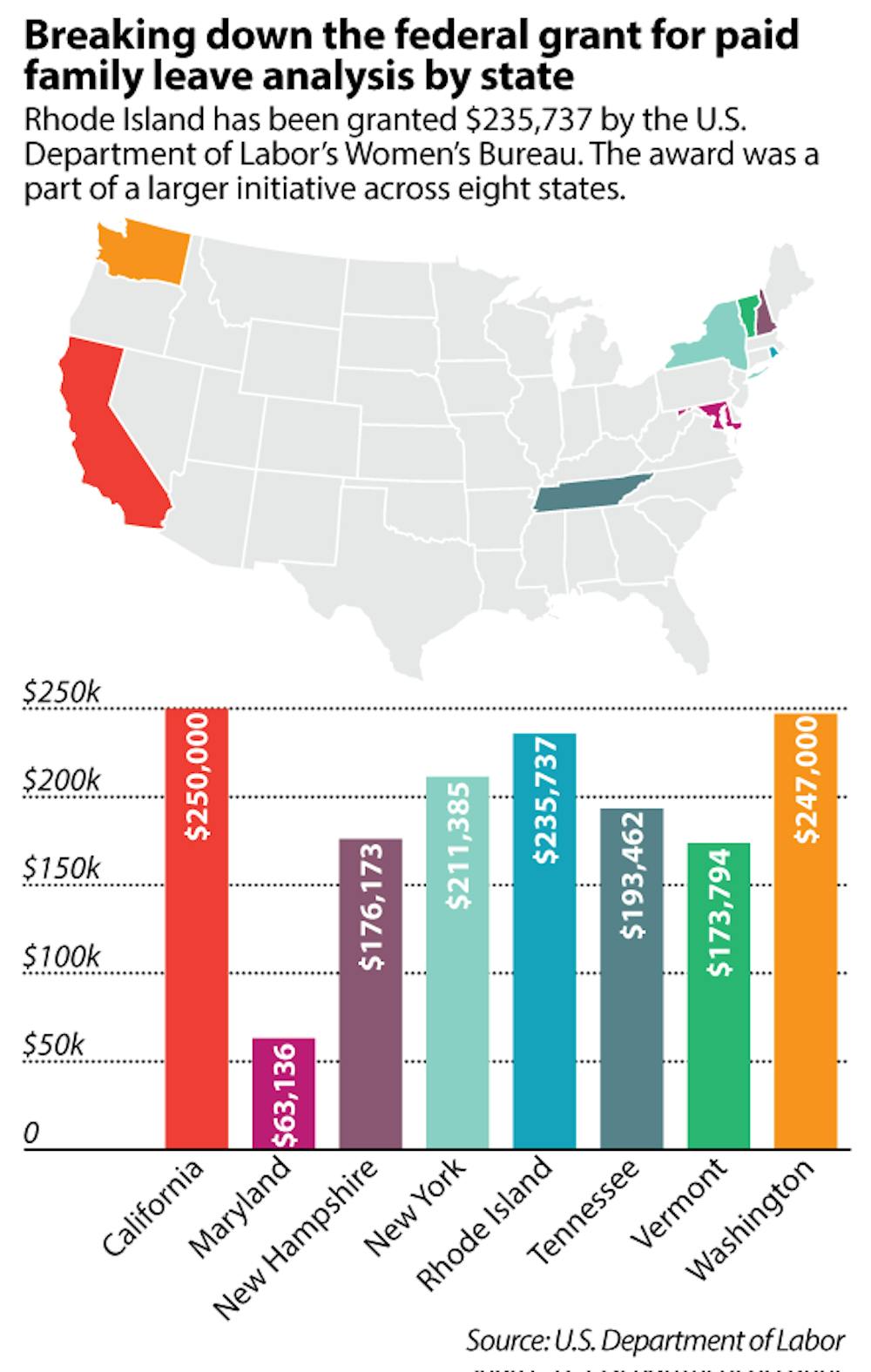Rhode Island has been awarded $235,737 by the Labor Department for its Temporary Caregiver Insurance Program, making it one of eight states to receive a portion of a larger $1.55 million grant.
The TCI program started in January 2014, making Rhode Island one of only three states in the U.S. — along with California and New Jersey — that offer paid family leave.
Paid family leave in Rhode Island provides all private and some public sector employees up to four weeks off per year, during which employees receive a portion of their paycheck. Reasons for paid family leave include bonding with a new child and caring for family members with serious health concerns.
The grant money awarded this year will be used toward tasks including evaluating the program’s reach, identifying gaps, addressing denials, designing Educational Ooutreach Marketing protocols for future state proposals and enhancing data collection, according to the grantee information from the Labor Department.
“The most recent grant money will allow (the University of Rhode Island) to kind of go deeper on the study that they’ve conducted and to gauge their opinion about whether or not they think that Rhode Island should expand,” said Mike Healey, chief public affairs officer at the state’s Department of Labor and Training.
Paid family leave is funded entirely by employees, amounting to about 64 cents a week for workers earning $40,060 a year, the Huffington Post reported. An employee must have paid $9,600 into the Temporary Disability Insurance fund to be eligible. Like those of California and New Jersey, Rhode Island’s TCI program builds off of the infrastructure of the state’s TDI program.
Only 12 percent of private sector workers in the United States have access to paid family leave through their employers, according to the Department of Labor.
“We know that this is a serious problem,” said Sarah Flesich Fink, senior policy counsel at the National Partnership for Women and Families. “As we become a more global economy, the U.S. really needs to catch up with the rest of the world,” she added.
Flesich Fink predicted that as people, businesses and lawmakers become more educated, the program will expand. The TCI program is beneficial to business because it “increases loyalty, turnover and productivity” among workers, and those who take paid family leave are more likely to return to work afterwards, she said.
Last month, 4,485 paid family leave were filed. Among the claims, caring for a newborn or adopted child accounted for over 80 percent, and caring for a family member accounted for over 18 percent. Less than 1 percent of eligible workers filed claims in Rhode Island. Payments averaged $572 per week.
Rhode Island’s TCI program diverges from others because it includes job protection, guaranteeing that employees who take a leave can return to their job.
“This is a really important tool for families in Rhode Island” said Sen. Gayle Goldin, D-Providence, who has spearheaded the promotion of paid family leave in Rhode Island.
Goldin said her decision to become a strong advocate for paid family leave was spurred by her own life experiences. In 2001, after having just moved to Rhode Island and purchased a house with her husband, Goldin suffered a severe back injury. She said her husband’s attempt to leave work when he did not have the time was a “strain” on their family and made her recovery more difficult.
Later that year, Goldin had her first child. She said her experience differed from that of her sister, who also had a child around the same time while living in Montreal. “My sister had 15 weeks of paid leave and I didn’t because I lived six hours south,” she said.
In September 2014, Rhode Island was awarded $161,417 by the Labor Department to research the efficacy and reach of the paid family leave program.
Study methods have included distributing a questionnaire that has yielded a high response rate and conducting interviews over the phone with customers, Healey said.
“What we hear from our customers is that they appreciate it,” Healey said. The program is a “very helpful program for working families,” he added.
Goldin said she would appreciate expansion. “I certainly would like to see us go beyond that four weeks. Having a little leeway is certainly helpful and its certainly a drop in the bucket compared to what other countries have.”
Rhode Island has “a lot to learn … about the use of paid family leave programs” from the eight states awarded the grants, Flesich Fink said.





